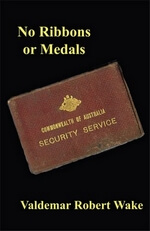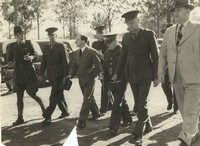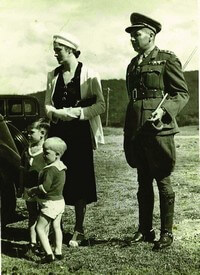Val Wake had always wanted to tell his father's story. While working in London he was told by his mother that there were academic researchers visiting the house who were interested in seeing Bob Wake's private papers. Bob died in 1974. He had left behind a rough draft for a book with a working title: Australia the pawn in the Pacific. There was also a number of books and typewritten notes and a work diary. Val suspected that other people had gone through his father's papers and removed some of his documents. He knew that during his father's working life he always kept a diary but there was only one diary left. That diary was for 1948 when arrangements were being made to form the Australian Security Intelligence Organization ( ASIO) for which Bob Wake was a founding director.
Val asked his mother to be careful about giving information to visiting researchers. He not only wanted to keep the material for his own project but he was also doubtful about his mother's knowledge and ability to explain her husband's work. Bob Wake rarely talked about his work at home. It was, when all said and done, an official secret.
When Val returned to Australia in 1996 he was surprised by the number of books in circulation with references to his father. Some of the references were factually incorrect and all of them portrayed a man who Val Wake did not recognise as his father. There were allegations of dishonesty, blackmailing and incompetency. Val was not sure about blackmailing and incompetency but he did know that his father was scrupulously honest when handling public money. The suggestion circulated by ASIO that his father was fiddling the agents' fund to feather his own nest was clearly not the case. His father rarely had any money. Bob's wife Betty was forced to go out and work because Bob was unable to give her enough money to pay the household bills.
Val's growing sense of anger and need to set the record straight spurred him on a paper trail to the official archive offices in Brisbane, Sydney, Adelaide, Canberra and Melbourne. In Canberra he also visited ASIO headquarters where he finally got access to his father's personal file that proved a gold mine for other researchers because once Val got ASIO to release the file the information was available to anyone who was interested.
The writing of Bob Wake's story was difficult. Val realised that he had to tread a narrow path and avoid any special pleading. He had to stick to the facts as he knew them and report them in detail. This accounts for the core chapter of the book where he uses the transcript of evidence given by Bob Wake's boss, Brigadier Bill Simpson, during the court hearing before Mr Justice Geoffrey Reed. None of this transcript had appeared in any other book about Bob Wake and was clear evidence that the charges against him were false.
When Val Wake's book was published by Jacobyte in 2003 his mother was disappointed by the title. As far as Betty Wake was concerned it implied some criticism of her husband. Val explained that it was a direct rebuttal of the Commander-in-Chief's charge about wearing ribbons and medals he was not entitled to. On reflection Val Wake now thinks that the title is more a comment on the intelligence community in Australia. The irony is that Bob Wake, as a result of his service during World War Two, was entitled to wear ribbons and medals but he never claimed them.
In 2006 Val Wake claimed his father's medals and they are held in the family strongbox.
copies of No Ribbons or Medals: the story of 'Hereward' an Australian counter espionage officer can be bought by contacting Digital Print Australia




